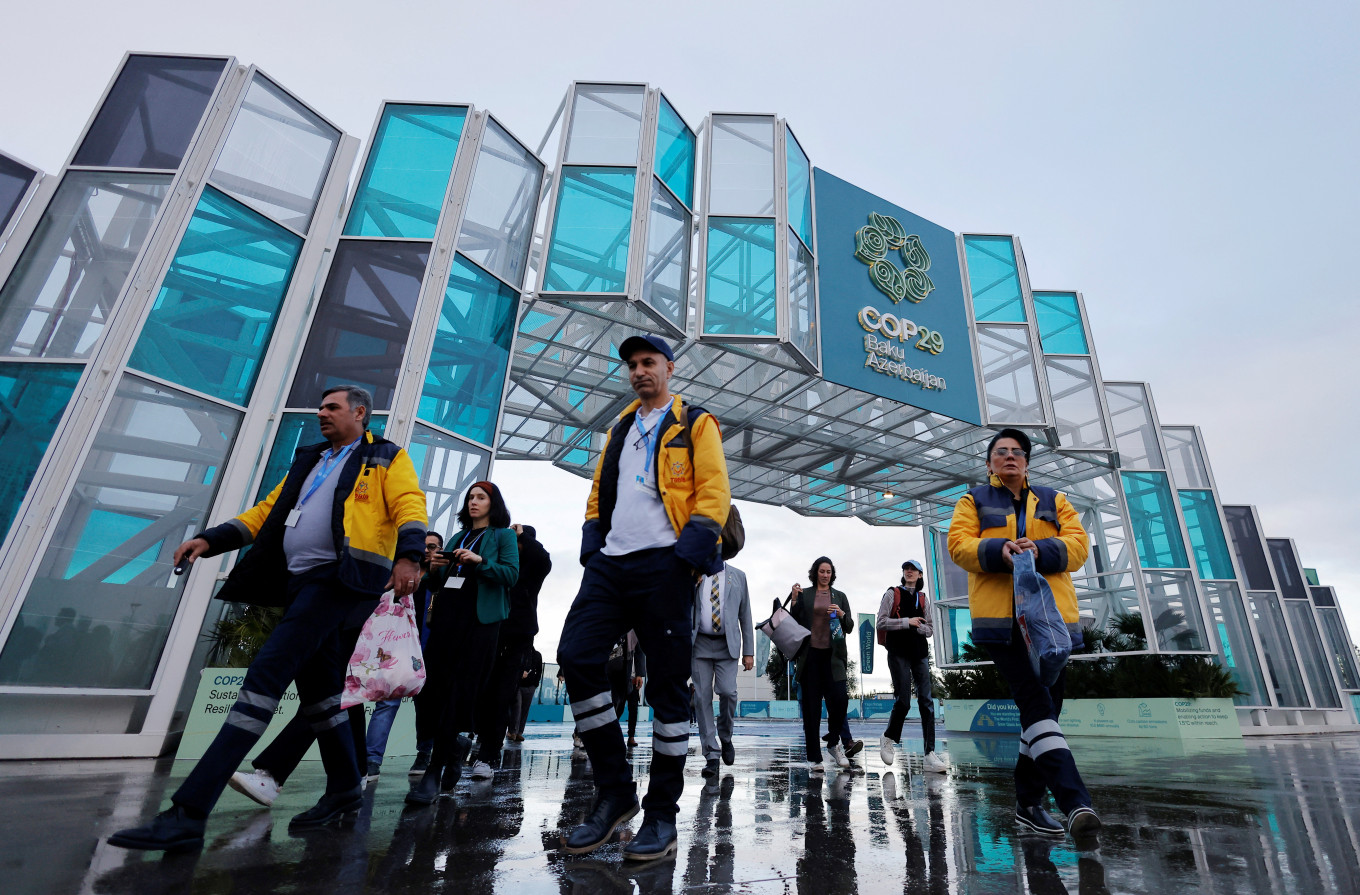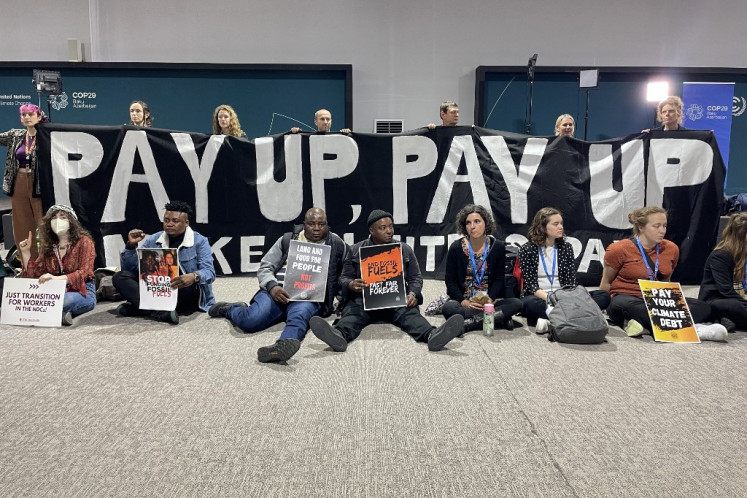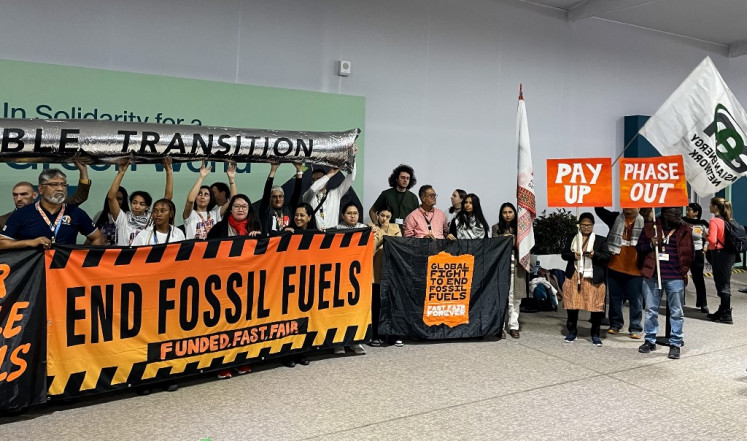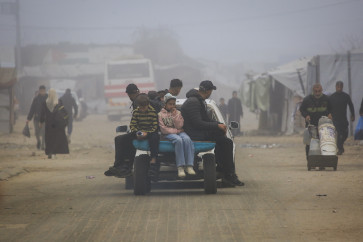Popular Reads
Top Results
Can't find what you're looking for?
View all search resultsPopular Reads
Top Results
Can't find what you're looking for?
View all search resultsCOP29 in extra time as poor nations reject $250 bn offer
The rejected proposal raised an existing commitment of $100 billion a year from rich nations but fell well short of what experts say developing nations need.
Change text size
Gift Premium Articles
to Anyone
H
eated negotiations on a global climate deal were set to spill into Saturday after developing nations rejected an initial US$250 billion offer from rich countries to help them tackle global warming.
COP29 hosts Azerbaijan said negotiations would drag "over the course of the night" in the Caspian Sea city Baku to produce a final text.
This will be put before nearly 200 nations for consensus approval on Saturday, not expected earlier than 10 a.m. local time.
The rejected proposal raised an existing commitment of $100 billion a year from rich nations but fell well short of what experts say developing nations need.
"It is shameful to put forward texts like these," said Tina Stege, climate envoy for the Marshall Islands, an atoll nation threatened by rising seas.
COP29 hosts Azerbaijan urged nations to keep striving but admitted the $250 billion figure, to be reached by 2035, was not "fair or ambitious" enough.
The Alliance of Small Island States, for which climate change is an existential threat, said the offer showed "contempt for our vulnerable people".
Ali Mohamed, chair of the African Group of Negotiators, another influential bloc imperiled by climate disaster, called the proposal "totally unacceptable and inadequate".
"$250 billion will lead to unacceptable loss of life in Africa and around the world, and imperils the future of our world," he said.
A group of 134 developing states including China had demanded at least $500 billion towards the cost of building resilience against climate change and reducing planet-warming emissions.
'Extraordinary reach'
But the United States signaled it was not looking to negotiate a higher figure.
President-elect Donald Trump takes office in two months and is expected to pull the world's largest economy again out of climate diplomacy.
"$250 billion will require even more ambition and extraordinary reach," said a senior US official, whose team in Baku comes from outgoing President Joe Biden's administration.
Germany, a longtime leader on climate where elections are due next year, said governments could not meet these costs alone, and debt restructuring and other financial tools would need to play a part.
Europe wants to "live up to its responsibilities, but also in a way that it doesn't make promises it can't live up to", German Foreign Minister Annalena Baerbock told reporters.
The draft text also sets an ambitious overall target to raise at least $1.3 trillion per year by 2035 from not only developed countries but the private sector.
Developing nations excluding China need $1 trillion a year in outside help by 2030, according to economists commissioned by the United Nations to assess needs.
These same economists said Friday that $250 billion was "too low and inconsistent" with globally agreed goals to keep climate change in check.
'Joke'
Obed Koringo, a Kenyan activist from CARE, said $250 billion was "a joke".
"From Africa, where I come from, what we are saying is [...] no deal is better than a bad deal," he said.
But Avinash Persaud, special advisor on climate change to the president of the Inter-American Development Bank, said that the offer showed the talks were "within sight of a landing zone" for the first time.
"There is no deal to come out of Baku that will not leave a bad taste in everyone's mouth," said the former advisor to Barbados Prime Minister Mia Mottley.
The United States and European Union have wanted newly wealthy emerging economies like China, the world's largest emitter, to chip into the pot.
China, which remains classified as a developing nation under the UN framework, provides climate assistance but wants to keep doing so on its own voluntary terms.
Separately, there was a push for stronger language in the deal to reaffirm a global pledge on moving away from coal, oil and gas, the main drivers of global warming.
A Saudi official speaking on behalf of the Arab Group said Thursday the bloc would "not accept any text that targets any specific sectors, including fossil fuel" in Baku.
Climate activists stage a protest inside the United Nations climate conference (COP29) venue to demand a phase out of fossil fuels during the climate summit in Baku, Azerbaijan on Nov. 15, 2024. (AFP/Laurent Thomet)Top German diplomat Baerbock singled out Saudi Arabia and warned that its goal was "turning back the clock".
Azerbaijan, an authoritarian state that relies on oil and gas exports, has been accused of lacking the experience and bandwidth to steer such large and complex negotiations.
"This is the worst COP in recent memory," said Mohamed Adow of the Climate Action Network.
The EU had also called for stronger leadership from Azerbaijan, whose leader, Ilham Aliyev, opened the conference by railing against Western nations and hailing fossil fuels as a "gift of God".
The annual UN-led climate talks come on what is already poised to be the hottest year in history and as disasters rise around the world.
Just since the start of COP29 on Nov. 11, deadly storms have battered the Philippines and Honduras, while Ecuador has declared a national emergency due to drought and forest fires and Spain has been reeling after historic floods.













